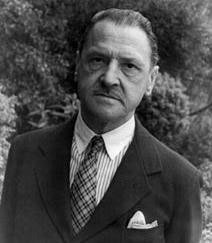William Somerset Maugham (1874-1965)
W.S. Maugham's masterpiece is generally agreed to be ‘Of Human Bondage’ (1915), a semiautobiographical novel that deals with the life of the main character Philip Carey, who, like Maugham, was orphaned, and brought up by his pious uncle. ‘Of Human Bondage’ was initially criticized in both England and the United States; the New York World described the romantic obsession of the protagonist Philip Carey as "the sentimental servitude of a poor fool". The influential critic and novelist Theodore Dreiser rescued the novel, referring to it as a work of genius and comparing it to a Beethoven symphony. His review gave the book a lift and it has never been out of print since. The Modern Library ranked ‘Of Human Bondage’ #66 on its list of the 100 best English-language novels of the 20th century. ‘Bondage’ was adopted as a movie three times (1934, 1946, 1964). W.S. Maugham’s other important works include: • ‘The Moon and Sixpence’ - fictional
life of French post-impressionist artist Paul Gauguin. Maugham was employed by the British Secret Intelligence Service, later renamed MI6, to undertake a special mission in Russia (1917) to keep the Provisional Government in power and Russia in the war by countering German pacifist propaganda. Maugham made his spying experiences into a collection of short stories about a gentlemanly, sophisticated, aloof spy, ‘Ashenden’, a volume that influenced the Ian Fleming James Bond series. z
|
